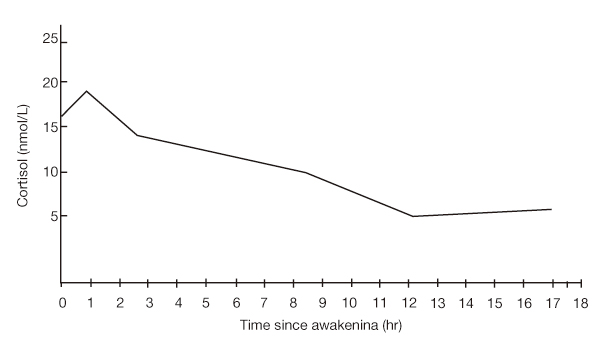J Korean Med Assoc.
2011 Jan;54(1):81-87.
Adrenal exhaustion and fatigue due to chronic stress
- Affiliations
-
- 1Bitsam Family practice, Seoul, Korea. bitsamclinic@gmail.com
Abstract
- Adrenal fatigue is a symptom complex occurring when chronic stress overwhelms one's own adaptation reserve. Morning fatigue, decreased performance, irritability, depressed mood, poor concentration, general myalgia, insomnia, cravings for stimulants, hypoglycemia, postural dizziness are the main symptoms. Adrenal fatigue or exhaustion is not a new concept. Selye presented the concept as a general adaptation syndrome to stress nearly 70 years ago, but it is still a valuable one. It is not easy to measure adrenal function; nowadays salivary cortisol/dehydroepiandrosterone levels taken many times in a day has developed and used frequently. A lot of psychological methods and relaxation techniques including relaxation response, proper nutrition with supplements/herbs, deep sleep and rest, graded exercises and social supports make the patients recover from the state. Diagnostic methods or managements must be developed more to handle this syndrome easily because this syndrome has become much more prevalent than during the last century due to rapid changes and instability of modern societies.
Keyword
MeSH Terms
Figure
Reference
-
1. Williams RH, Larsen PR, Kronenberg HM, Melmed S, Dolonsky K. Williams textbook of endocrinology. 2003. 10th ed. Philadelphia: Saunders;1927.2. Selye H. The stress of life. 1984. revised ed. New York: McGraw-Hill.3. Tintera JW. The hypoadrenocortical state and its manage-ment. N Y state J Med. 1955. 55:1869–1876.4. Selye H. A syndrome produced by diverse nocuous agents. Nature. 1936. 138:32.
Article5. Cohen S, Schwartz JE, Epel E, Kirschbaum C, Sidney S, See-man T. Socioeconomic status, race, and diurnal cortisol decline in the Coronary Artery Risk Development in Young Adults (CARDIA) Study. Psychosom Med. 2006. 68:41–50.
Article6. Fries E, Hesse J, Hellhammer J, Hellhammer DH. A new view on hypocortisolism. Psychoneuroendocrinology. 2005. 30:1010–1016.
Article7. Ahn YW. Adrenal fatigue and stress. Korean J Stress Res. 2010. 18:Suppl 1. 12–15.8. Benson H, Beary JF, Carol MP. The relaxation response. Psychiatry. 1974. 37:37–46.
Article9. Hess WR, Hughes JR. The functional organization of the diencephalon. 1957. New York: Grune and Stratton.10. Benson H, Rosner BA, Marzetta BR, Klemchuk HM. Decreased blood-pressure in pharmacologically treated hypertensive patients who regularly elicited the relaxation response. Lancet. 1974. 1:289–291.
Article11. Fulcher KY, White PD. Randomised controlled trial of graded exercise in patients with the chronic fatigue syndrome. BMJ. 1997. 314:1647–1652.
Article
- Full Text Links
- Actions
-
Cited
- CITED
-
- Close
- Share
- Similar articles
-
- Exploring the Mediation of Stress and Emotional Exhaustion on Academic Ineffectiveness and Cynicism Among University Students
- Fatigue and Job-Stress of Flight Dispatcher
- A study on the Stress and Fatigue of Research Workers
- Expression of Preadipocyte Factor-1 (Pref-1) and Vitamin D3 Up-regulated Protein 1 (VDUP1) Genes in Rat Adrenal Gland following Chronic Immobilization Stress
- Emotional Labor, Job Stress and Professional Quality of Life of Public Health Nurses according to the Employment Type


